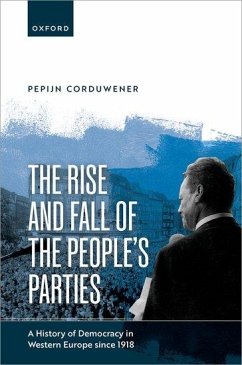Dr Pepijn Corduwener (Associate Professor, Associate Professor, Utr
The Rise and Fall of the People's Parties
A History of Democracy in Western Europe Since 1918
Dr Pepijn Corduwener (Associate Professor, Associate Professor, Utr
The Rise and Fall of the People's Parties
A History of Democracy in Western Europe Since 1918
- Gebundenes Buch
- Merkliste
- Auf die Merkliste
- Bewerten Bewerten
- Teilen
- Produkt teilen
- Produkterinnerung
- Produkterinnerung
The Rise and Fall of the People's Parties explores the striking parallels between the history of democracy and that of the people's parties since 1918. It demonstrates that understanding the rise and fall of the people's parties is pivotal to understanding the contemporary crisis of democracy.
Andere Kunden interessierten sich auch für
![The People's Peace The People's Peace]() Kenneth O. Morgan (King's College London Visiting Professor)The People's Peace29,99 €
Kenneth O. Morgan (King's College London Visiting Professor)The People's Peace29,99 €![The Oxford Handbook of American Political Parties and Interest Groups The Oxford Handbook of American Political Parties and Interest Groups]() Louis Sandy MaiselThe Oxford Handbook of American Political Parties and Interest Groups68,99 €
Louis Sandy MaiselThe Oxford Handbook of American Political Parties and Interest Groups68,99 €![A People's History of Europe A People's History of Europe]() Raquel VarelaA People's History of Europe33,99 €
Raquel VarelaA People's History of Europe33,99 €![Making the British empire, 1660-1800 Making the British empire, 1660-1800]() Making the British empire, 1660-180029,99 €
Making the British empire, 1660-180029,99 €![The People's War The People's War]() John WillisThe People's War34,99 €
John WillisThe People's War34,99 €![The Lights That Failed The Lights That Failed]() Zara Steiner (Emeritus Fellow, New Hall, University of Cambridge.)The Lights That Failed79,99 €
Zara Steiner (Emeritus Fellow, New Hall, University of Cambridge.)The Lights That Failed79,99 €![Parties Without Partisans Parties Without Partisans]() Martin P. Wattenberg (, Department of Political Science, UniversityParties Without Partisans75,99 €
Martin P. Wattenberg (, Department of Political Science, UniversityParties Without Partisans75,99 €-
-
-
The Rise and Fall of the People's Parties explores the striking parallels between the history of democracy and that of the people's parties since 1918. It demonstrates that understanding the rise and fall of the people's parties is pivotal to understanding the contemporary crisis of democracy.
Produktdetails
- Produktdetails
- Verlag: Oxford University Press
- Seitenzahl: 266
- Erscheinungstermin: 10. November 2023
- Englisch
- Abmessung: 236mm x 158mm x 23mm
- Gewicht: 564g
- ISBN-13: 9780192843418
- ISBN-10: 0192843419
- Artikelnr.: 68546209
- Herstellerkennzeichnung
- Libri GmbH
- Europaallee 1
- 36244 Bad Hersfeld
- gpsr@libri.de
- Verlag: Oxford University Press
- Seitenzahl: 266
- Erscheinungstermin: 10. November 2023
- Englisch
- Abmessung: 236mm x 158mm x 23mm
- Gewicht: 564g
- ISBN-13: 9780192843418
- ISBN-10: 0192843419
- Artikelnr.: 68546209
- Herstellerkennzeichnung
- Libri GmbH
- Europaallee 1
- 36244 Bad Hersfeld
- gpsr@libri.de
Pepijn Corduwener is interested in the contemporary history of democracy in Europe. His publications include The Problem of Democracy in Postwar Europe (2017) and 1989 and the West. Western Europe since the End of the Cold War (2019, co-edited with Eleni Braat), while he has also published in Contemporary European History, the Historical Journal, Comparative Political Studies and The Journal of Political Ideologies. He has been a visiting scholar at the School of Government of the LUISS University in Rome and the Centre for European History, Oxford University and currently teaches history at Utrecht University.
* Introduction. The people's parties and democracy in past and present
* Part I. The making and breaking of party democracy, 1918-1945
* 1: 1. The end of the War: party democracy and the legacies of the
nineteenth century
* 2: Blueprints of the people's party and the challenge of polarization
in the 1920s
* 3: Crisis and collapse: the people's party in the clash of competing
conceptions of mass politics
* 4: Democracy's interwar crisis as learning experience
* Part II. People's party democracy in postwar Europe, 1945-1968
* 5: Rethinking party politics after the War
* 6: The Christian democrat decade
* 7: Socialists from class to people's parties
* 8: Consensus, collaboration, compromise: democracy as
'super-ideology' in the 1960s
* Part III. The fall of the people's parties and the crisis of the
postwar model of democracy, 1968-2000
* 9: The challenge of 1968 and the aim to reaffirm the primacy of the
people's parties
* 10: The challenge of 1973 and governability as leading purpose
* 11: The 'open party' and its limits in the 1980s
* 12: The decline of the people's party, fast and slow
* Epilogue. Democracy without people's parties?
* Part I. The making and breaking of party democracy, 1918-1945
* 1: 1. The end of the War: party democracy and the legacies of the
nineteenth century
* 2: Blueprints of the people's party and the challenge of polarization
in the 1920s
* 3: Crisis and collapse: the people's party in the clash of competing
conceptions of mass politics
* 4: Democracy's interwar crisis as learning experience
* Part II. People's party democracy in postwar Europe, 1945-1968
* 5: Rethinking party politics after the War
* 6: The Christian democrat decade
* 7: Socialists from class to people's parties
* 8: Consensus, collaboration, compromise: democracy as
'super-ideology' in the 1960s
* Part III. The fall of the people's parties and the crisis of the
postwar model of democracy, 1968-2000
* 9: The challenge of 1968 and the aim to reaffirm the primacy of the
people's parties
* 10: The challenge of 1973 and governability as leading purpose
* 11: The 'open party' and its limits in the 1980s
* 12: The decline of the people's party, fast and slow
* Epilogue. Democracy without people's parties?
* Introduction. The people's parties and democracy in past and present
* Part I. The making and breaking of party democracy, 1918-1945
* 1: 1. The end of the War: party democracy and the legacies of the
nineteenth century
* 2: Blueprints of the people's party and the challenge of polarization
in the 1920s
* 3: Crisis and collapse: the people's party in the clash of competing
conceptions of mass politics
* 4: Democracy's interwar crisis as learning experience
* Part II. People's party democracy in postwar Europe, 1945-1968
* 5: Rethinking party politics after the War
* 6: The Christian democrat decade
* 7: Socialists from class to people's parties
* 8: Consensus, collaboration, compromise: democracy as
'super-ideology' in the 1960s
* Part III. The fall of the people's parties and the crisis of the
postwar model of democracy, 1968-2000
* 9: The challenge of 1968 and the aim to reaffirm the primacy of the
people's parties
* 10: The challenge of 1973 and governability as leading purpose
* 11: The 'open party' and its limits in the 1980s
* 12: The decline of the people's party, fast and slow
* Epilogue. Democracy without people's parties?
* Part I. The making and breaking of party democracy, 1918-1945
* 1: 1. The end of the War: party democracy and the legacies of the
nineteenth century
* 2: Blueprints of the people's party and the challenge of polarization
in the 1920s
* 3: Crisis and collapse: the people's party in the clash of competing
conceptions of mass politics
* 4: Democracy's interwar crisis as learning experience
* Part II. People's party democracy in postwar Europe, 1945-1968
* 5: Rethinking party politics after the War
* 6: The Christian democrat decade
* 7: Socialists from class to people's parties
* 8: Consensus, collaboration, compromise: democracy as
'super-ideology' in the 1960s
* Part III. The fall of the people's parties and the crisis of the
postwar model of democracy, 1968-2000
* 9: The challenge of 1968 and the aim to reaffirm the primacy of the
people's parties
* 10: The challenge of 1973 and governability as leading purpose
* 11: The 'open party' and its limits in the 1980s
* 12: The decline of the people's party, fast and slow
* Epilogue. Democracy without people's parties?








